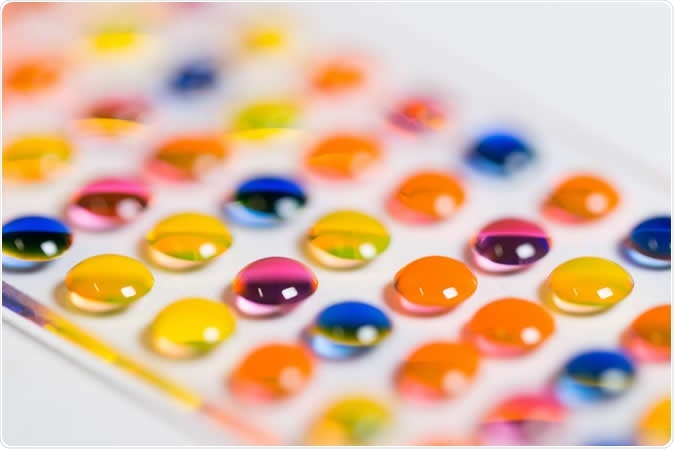Scientists at the Karlsruhe Institute of Technology (KIT) have come up with a miniaturized and accelerated system of new drug development on just one chip, promising to make the process faster and cheaper than ever before. The report was published in the journal Nature Communications on June 28, 2019.
The demand for newer drugs is constantly rising with the emergence of novel and drug resistant diseases. However, fewer new drugs are actually being developed (about 600 over the period 1991-2010 in the top countries). One big reason is the sheer complexity and expense of the many steps involved, which are typically performed one after the other, in separate processes. However, this may no longer be the case, say the KIT scientists who developed a new combinatorial on-chip process.

Array of microdroplets with various reactants on the chemBIOS chip-based synthesis platform. Image Credit: Maximilian Benz, KIT
The traditional process of drug development is a slow and tedious one. It begins with searching compound databases for new active chemicals, producing them individually in adequate quantities using high-throughput systems to build a compound library, characterizing them, and cell-based screening to make sure they possess activity in biological systems. Compounds with promising activity are called hits and are returned for further exploration. The process is repeated for different variations of the hits to form a secondary library of molecules with molecules optimized for the intended application.
Several runs are required before the final candidates are established, and these enter the medical phase of development for testing in clinical studies. Only one among the thousands of molecules screened initially reaches this stage. Sometimes none of the hits makes it through drug approval. The flaws in this workflow are obvious: it is slow, cumbersome, consumes much reagent and solvents, costs a huge amount and limits the number of initial compounds screened within the limits of feasibility. At present, drug development cycles often span two or more decades at a cost of 2 to 4 billion dollars, making them huge, slow and extremely costly beasts.
An advance in this field is the use of solid-phase synthesis in microarray format to miniaturize and combine the synthesis of multiple compounds. However, it does not allow cell-based assays for bioactivity in most cases. Until now, there were no miniaturized processes to run high-throughput production workflows for liquid phase chemicals. Secondly, compounds with biological activity cannot be produced and screened simultaneously using the same process.
The new on-chip combinatorial platform chemBIOS could change all that. KIT scientist Maximilian Benz says, “We have developed a platform that combines synthesis of compound libraries with biological high-throughput screening on a single chip.”
The chemBIOS platform can thus deal with all three components of the drug development process at once: synthesize a database of fats in a microarray format using organic solvents, use mass spectroscopy techniques to characterize all of them in a single step, and then test them for bioactivity using aqueous solutions. Following synthesis, the fats form lipoplexes, or lipid-nucleic acid complexes, which can be taken up for use by both animal and human cells for bioassays. The chemBIOS chip allows single-step transfer of the whole library from the organic solvent platform (for synthesis and characterization) to the aqueous solution platform (for high-throughput bioassay) by sandwiching them. In this way, says Benz, the chip is used to “perform 75 parallel three-component reactions for synthesis of a library of lipids, i.e. fats, followed by characterization using mass spectroscopy, on-chip formation of lipoplexes, and biological cell screening.”
The advantages are enormous. It cuts down on the time required and uses only miniscule amounts of all the solutions, as against the usual requirement of several liters of reactant, solvent fluids, and cell suspensions. It allows multiple screenings of the same library to enhance the identification of hits.
The chemBIOS is a front-runner for the 2019 NEULAND Innovation Prize awarded by KIT). It seems that this prize-winning technology could lead to incredibly fast and inexpensive drug development if its potential is borne out in future tests. More work is needed for reactions involving high temperatures, gaseous byproducts, solid reagents, or those which need a strictly controlled environment. High-throughput purification is another avenue that needs to be explored, but the flat surface of the chemBIOS chip would apparently favor such methods.
Benz puts it all together: “The entire process from library synthesis to cell screening takes only three days and about 1 ml of total solution, demonstrating the potential of the chemBIOS technology to increase efficiency and accelerate screenings and drug development.”
Journal reference:
Marrying chemistry with biology by combining on-chip solution-based combinatorial synthesis and cellular screening, Maximilian Benz, Mijanur R. Molla, Alexander Böser, Alisa Rosenfeld & Pavel A. Levkin, Nature Communicationsvolume 10, Article number: 2879 (2019), 10.1038/s41467-019-10685-0
ID, https://www.nature.com/articles/s41467-019-10685-0